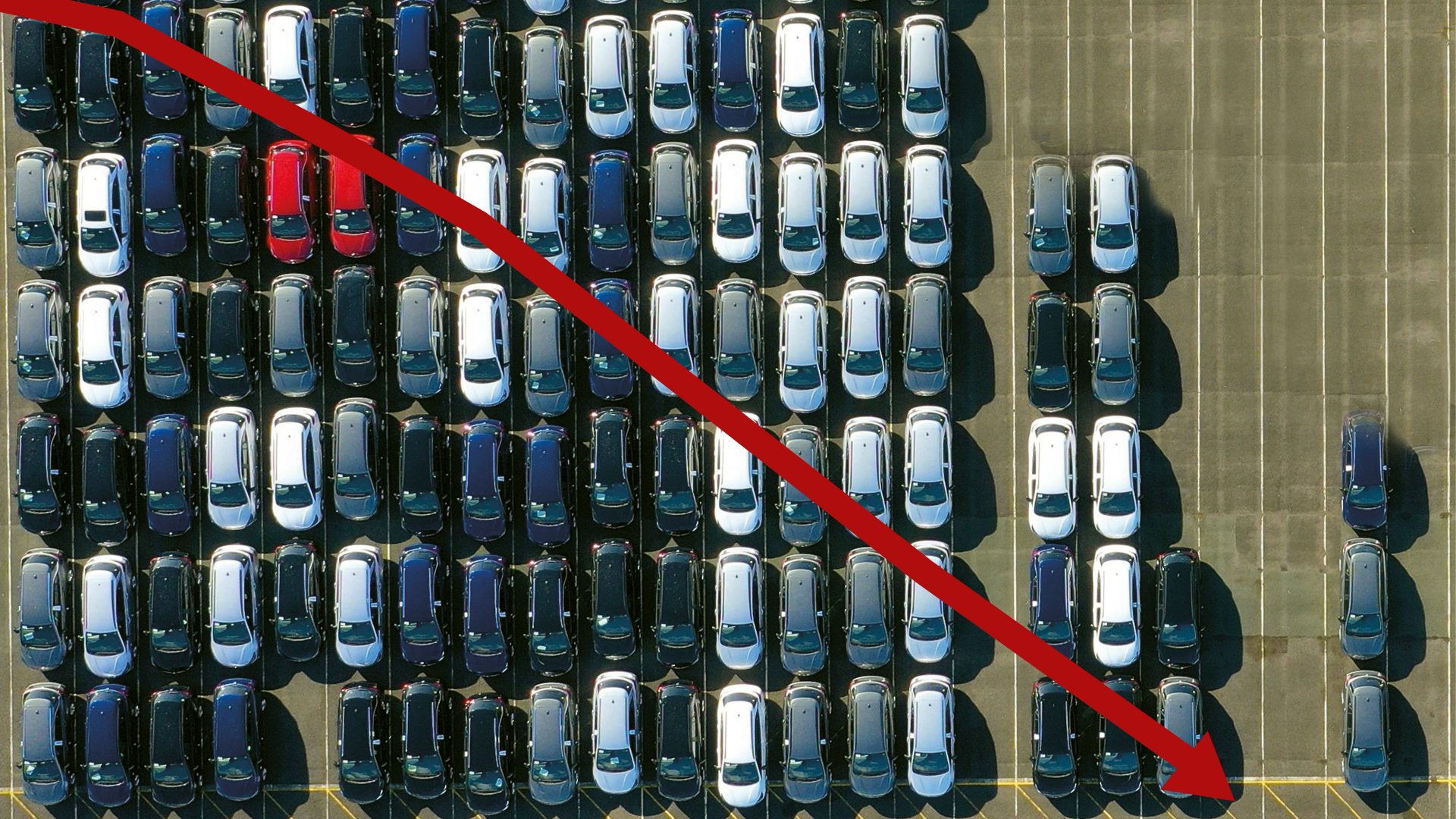The car industry in the UK is in a sorry state. During the first three months of the year, a total of 207,347 new cars were built in the UK, down from 306,558 in the same three months in 2021. You get an even better and starker idea of the decline if you compare the figures with total car production in 2017, when the industry here had a brilliant year and made almost 1.8m cars. In short, it has more than halved in five years.
Those disastrous falls are down to many factors including Covid, the near-collapse of the global supply chain, microchip shortages and, of course, Brexit.
But they also come at a time when the industry is pouring billions into changing its very business model, from making gas-guzzlers to building hybrids and then electric-only cars as fast as it can.
At its heels, the industry can hear the winged chariots of Tesla and Rivian drawing ever nearer. They have started from scratch and their share values are now higher than those of the traditional car giants. They can throw almost limitless amounts of money at problems, launch brand new designs, build purpose-made factories from scratch and, as a result, their share prices have soared.
The prospect must be terrifying for the likes of BMW, VW, Ford, Toyota, Nissan and all the rest. Now the battle is on to stay ahead of these arrivistes and redesign and relaunch just about every model they make.
Where does the UK stand in all this? Frankly, it is on the edge of Europe and with a government struggling to put together a new, post-Brexit industrial policy.
It doesn’t start with a very good hand. The UK is no longer a major player in the world car market. It used to be the second-largest carmaker in the world, now it is 14th between Indonesia and Mexico. In an average year, it makes about 1.3m cars. Meanwhile, China makes 26m, the US about 11m and Germany 5m.
Also, the UK is very dependent on exports; it sells about 80% of its production abroad and most of that to the rest of Europe. It needs access to the EU car market, or it will die.
As the long, slow death of Rover showed, the UK is not very good at making cars, unless the car plant is owned and run by foreigners. But that means the UK must keep getting foreign carmakers to build their new models in the UK and that is an increasingly difficult thing to do.
Margaret Thatcher was famously able to attract Nissan to Sunderland because the UK was in the Single Market. In fact, Margaret Thatcher and her EU Commissioner, Lord Cockfield, were the driving force behind the development of the Single Market, which removed hundreds of barriers to trade across the EU, unified regulations and opened up huge markets.
All of that is now at risk from Brexit and the move to electric vehicles.
One industry expert I spoke to doubts whether there is a long-term future for large-scale car production in the UK. Erecting barriers to trade and the movement of components, creating new red tape and delays for the industry are all immensely stupid things to do. It all means that leaving the Single Market was a game-changer.
And that has come just as the death of petrol and diesel vehicles makes things much worse. That’s because the economics of electric vehicles are very different. Batteries are such a new, large and heavy component that it pays to have your car factory next door to your battery plant.
That’s why the British government is desperate to attract the battery-producing gigafactories to the UK – the new electric vehicle car plants will follow. The government thinks Brexit has helped because it means the UK can throw money at the industry. The decision by the government to end the sale of new petrol and diesel cars by 2030 has given it a nice shield to hide behind. Now it can claim it is not subsidising new car production, but just creating a new green industry.
It plans to spend £500m to encourage the changeover, attract battery factories and adapt the supply chain.
But the EU’s response to this problem has been far bigger – in fact five times bigger. It is spending €2.9bn (£2.5bn) on plans to go electric and individual member states will add even more to the pot. It’s hardly surprising, then, that the EU is planning 38 new gigafactories, while the UK so far has announced one.
The UK is just not as attractive as it was for the international car giants. You only have to look at the scale of investment in the EU to realise how quickly the UK is now falling behind.
The expansion of the gigafactory supplying Nissan in Sunderland will mean it can produce 11GWh of batteries, and it is planning to eventually increase production to 39GWh.
In January, EV battery start-up Britishvolt secured government backing for a battery plant in northern England, which should make another 30GWh of battery production. In the EU, VW alone is planning to build six gigafactories of 40GWh each by 2030, giving it 240GWhs of production.
The Tesla gigafactory in Berlin, which Elon Musk said did not come to the UK because of “Brexit uncertainty”, is set to produce between 100 and 250GWhs of batteries.
Batteries also pose a Brexit dilemma for the British motor industry. The EU insisted that the UK Brexit deal included rules of origin, so a large proportion of a car’s components need to have originated in the UK or the EU. Batteries make up such a large percentage of an electric car’s value that a battery imported from, say, China and put in a British-built vehicle could mean the car would face tariffs if sold in the EU, because it would count as Chinese.
For the UK car industry, like many others, Brexit is a huge hindrance, not a help. Without battery plants it cannot make and sell cars in the EU, yet the government’s claimed freedom from EU rules has led to the UK government being less generous and proactive than the EU, not more.
If the UK government has an industrial policy, the car industry is having serious problems finding it.
This all helps to explain why Bloomberg is now reporting that Jaguar Land Rover is in talks with Northvolt and SVolt Energy about supplying batteries for a range of EVs it may assemble in Slovakia. Moving the production of iconic British brands abroad is the natural consequence of Brexit and batteries – suddenly Slovakia is a far more attractive option.
This is not like a tyre that blows out when you are driving at 70mph on the M6 in the rain. There will be no spectacular crash that will destroy the industry overnight. Rather it is like an old car that needs endless repairs and is increasingly expensive to run.
The British taxpayer will spend ever-larger amounts of money to keep it going, yet find it is constantly overtaken by newer, better vehicles. You do not shift whole car plants in which you have invested billions. If they become less attractive and less profitable, you milk them for as much as you can and manage their decline.
The UK will find it harder and harder to attract new production capacity, research and investment – not impossible, just harder. As that investment declines, so will the supply chains that only exist in the UK to feed those foreign firms.
Productivity will also take another huge hit, because not only are foreign-owned and run car factories very efficient, but they demand higher and higher standards from their suppliers. When they come to the UK they force up British productivity across many sectors. If they stop coming, the UK loses that increase in productivity.
As the Office for Budget Responsibility knows full well, the fall in trade and investment that Brexit is causing is what is doing the real damage to the UK’s economy. Lost foreign investment means lost productivity and that means lost growth.
Niche vehicle manufacturers and some British icons will survive, under mainly foreign ownership. But the transformation to electric vehicles and the British government’s inadequate post-Brexit response is speeding up the decline of large-scale motor manufacturing in the UK.
One day we will wake up and discover that the UK is not even a third-tier car manufacturing country.




